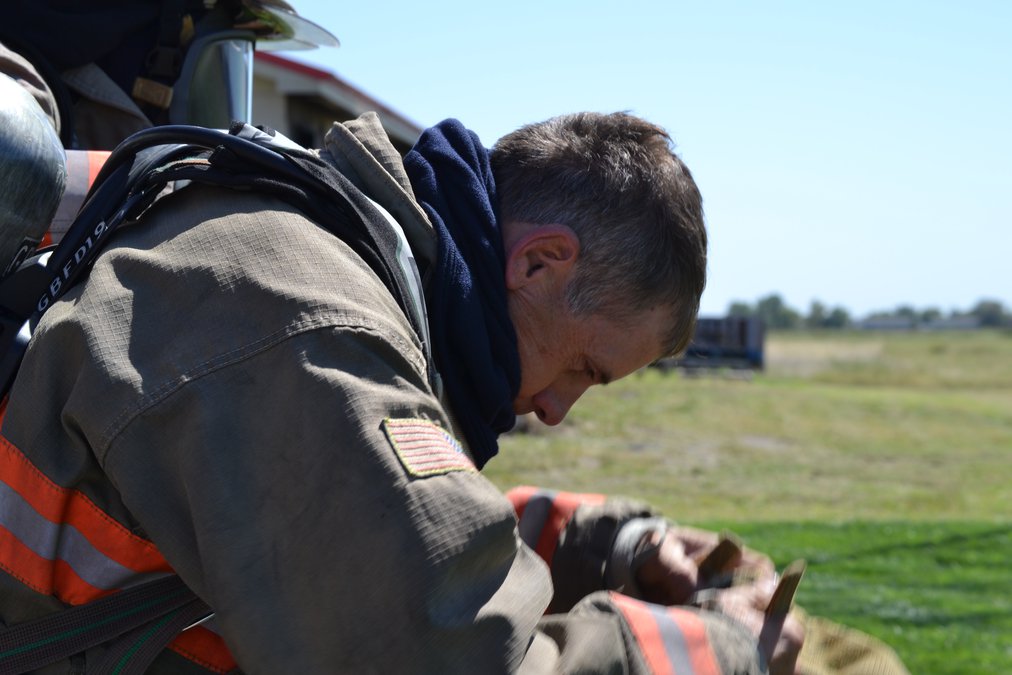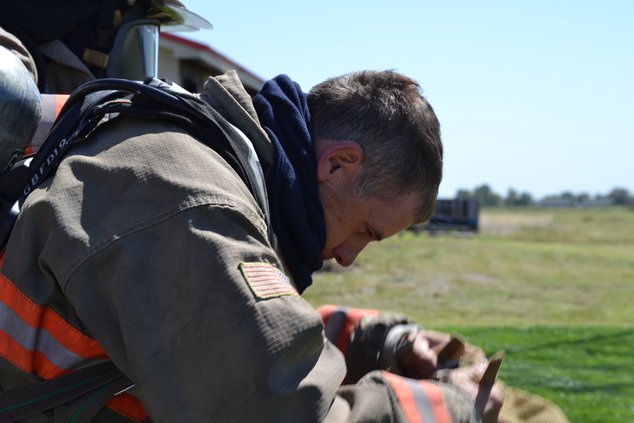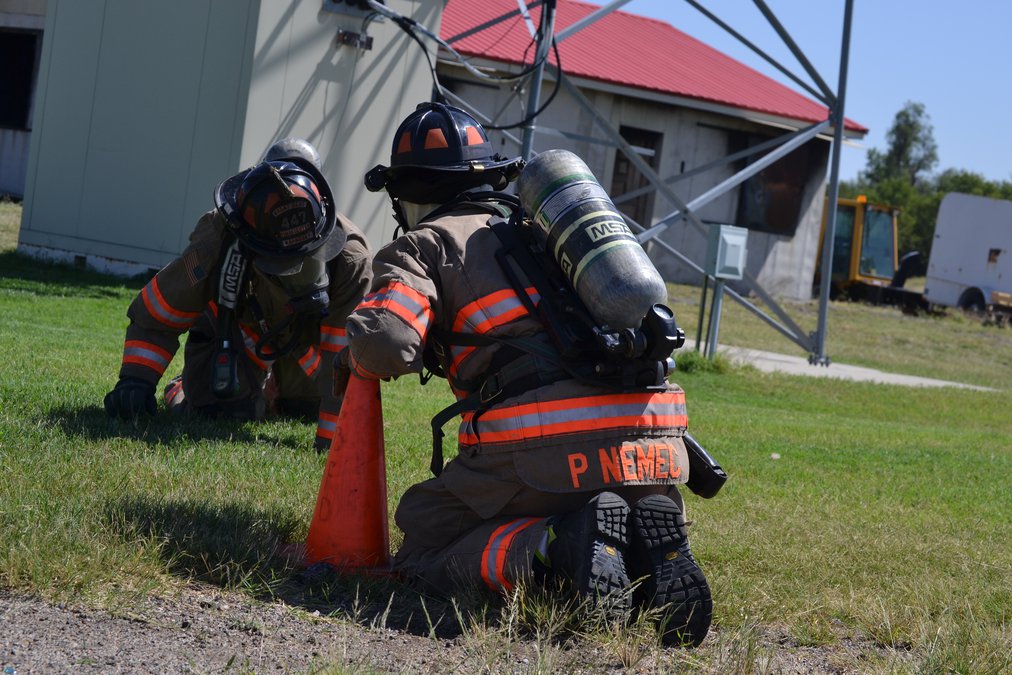Editor’s note: Thursday afternoon, the Great Bend Tribune sat down with the B-shift of the Great Bend Fire/EMS Department following a training session to find out what a day in the life of a Great Bend firefighter looks like, and what the firefighters encounter along the way.
They’re not just working nine to five, but for members of the Great Bend Fire/EMS Department, there’s definitely no better way to make a living.
Instead, their shifts are 24-hour rotations. Great Bend firefighters work three 24-hour shifts, with 24 hours off in between each, and after those three shifts, have four days off. The average month sees them working about ten 24-hour shifts, averaging approximately 56 hours per week over the course of a month. The Great Bend department has three crews to cover these shifts.
In the course of those shifts, they need to be prepared for anything from the routine to the life-threatening.
But, says Capt. Mark Pohlman, when they are not out on calls, their days are filled with a lot more than just sitting and waiting for the next call to come in.
What the day looks like
Their days, which begin at 8 a.m. and run until 8 a.m. the next day, often begin with briefings from the previous shift, ensuring they can address any problems that need to be addressed.
After that, they go through basic equipment checks first thing in the morning including making sure air tanks are full and the vehicles are in working order.
Also, each morning, they try to get exercise time in, whether it’s jogging, weightlifting, or running the Station 2 tower with gear on, because staying fit is an important part of such a physically demanding job.
And like any family environment, there are also chores to do. Pohlman said a lot of time is spent ensuring the stations and equipment are thoroughly cleaned, sanitized, and in working order, and that the station grounds are well-kept.
“Just like being on a farm, you always find something that needs to be done,” Pohlman said.
In the midst of all of it, firefighters will do training exercises to prepare them for real world situations, such a the smoke training exercise they worked on Thursday afternoon, which helped them train for disorienting environments presented in smoke-filled structures.
Along with the daily work and training, each call they go on requires reports to be filled out, so there is a great deal of daily paperwork which goes along with the job, as well.
Even in the evenings, when there’s a little more downtime, there is still work to be done. Because there is so much classroom training required, they will spend evenings doing on class work and homework.
Because a firefighter has to know learn so much so quickly, more experienced members aid newer team members, such as Chris Kell, the newest member of the B-shift, and train in the evenings, as well.
Pohlman said helping their whole team be prepared is important because you have to trust your colleagues with your own life, both in getting to the scene of a call and once you arrive. Being able to trust each other is vital to what they do, because they depend on each other for safety in dangerous situations.
And all of it helps them be prepared for whatever they encounter when the calls do come in.
Be prepared for anything, anytime
Adding to the challenge of their work, said Patrick Nemec, is the fact that their department is a combined fire and Emergency Medical Service department, where other larger cities have separate departments for each. For him, this means not always knowing what to expect when a call comes in.
“You don’t know if you’re going to get 15 EMS calls today, or five EMS calls and two fires, or nothing; you never know,” Nemec said.
Sometimes, he said, there’s not even time to stop between calls, and often they have to head straight from one call to another, so they have to be prepared to shift gears quickly.
“You’re on an ambulance call, you get to the hospital, and the fire comes out, and so you take the ambulance to the fire call,” Nemec said.
Because their jurisdiction covers rural parts of Barton County, they have to deal with more than other city fire departments might.
For Great Bend firefighters, all this adds up to having to be prepared to deal with a wide range of potential issues.
This includes being prepared for medical emergencies, car wrecks, grass fires, house fires, and a host of other issues. They are also one of the only dive-trained units in western Kansas, so they also must be prepared to deal with water search and rescue.
Sometimes, it means multiple issues on the same call.
“You show up to a structure fire, if you have a person you pull out, we’ll go straight from there, put them in an ambulance and take care of them,” Nemec said.
Pohlman said it can be a challenge not knowing what kind of environment they will encounter, because each house is configured differently and they never know what conditions they will find when they get there.
Though it presents a challenge, Kaleb Karnosky said being able to learn so many different disciplines, such as fire training, EMS training, and dive training, is also one thing he enjoys about the job.
But being trained to handle high-pressure crisis situations quickly is a crucial part of their work.
“You get on the scene or someone’s still inside of a fire, your training will take effect, you’ll be able to get in there and give them a chance to survive,” Pohlman said. “Or if it’s someone’s house, you put it out, so maybe they salvage some of their belongings.”
It’s this human element, dealing with individuals in crisis, that is central to the work they do on a daily basis. Sometimes, they said, they get calls as small as someone who has fallen and needs help getting up, or someone who just needs someone to talk to.
But they are ready for the people who need them, whether the problem is big or small.
A family environment
Karnosky said one of the things that keeps him doing the job is the camaraderie of working with the same crew each shift, and the closeness that having individuals of different personalities working together brings.
With the significant amount of time shift crews spend living together, Pohlman described the relationships with the crews as being like a marriage.
“It’s a third of your life, 24-hour shifts, day and night, so you learn to like your guy,” Pohlman said.
Often, though, the work comes at the expense of sacrificing time with their own families. Pohlman said firefighters often miss out on a lot of holidays and family functions, as well as a lot of activities their kids might be involved in.
Even on days off, firefighters can be called in on large calls which require more than one crew, or on larger calls in a different jurisdiction. So they always have to be ready.
“You’re just hanging out at your house, and the next thing you know, you’re bringing someone to the hospital wearing shorts and a T-shirt,” Karnosky said.
It’s not your average 40-hour week, but the men on B-shift at the Great Bend Fire Department would not have it any other way.







